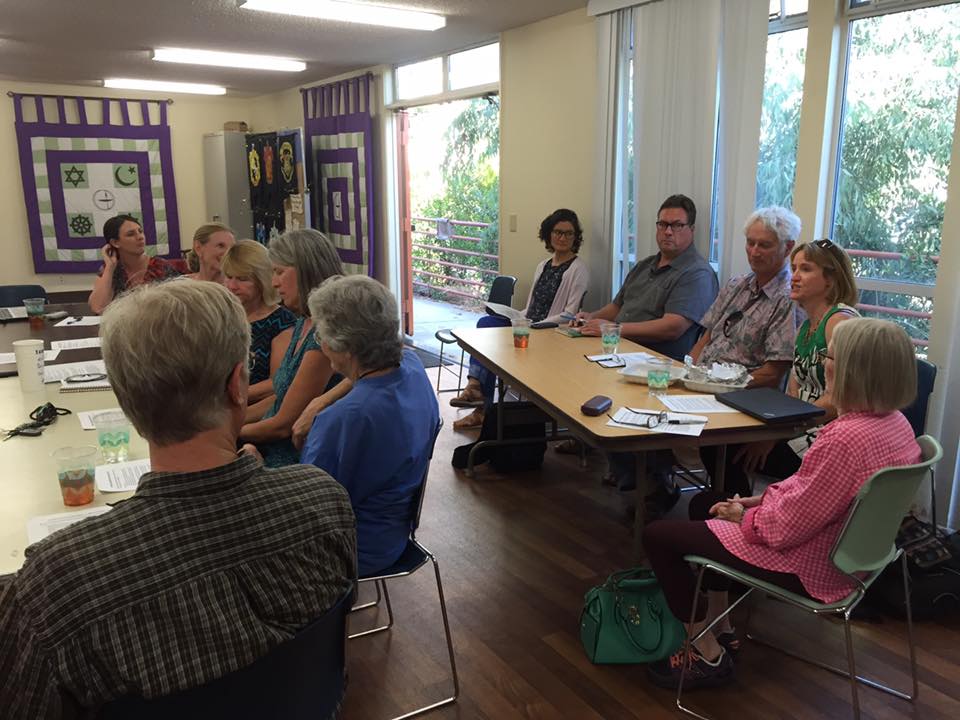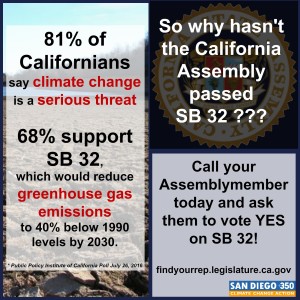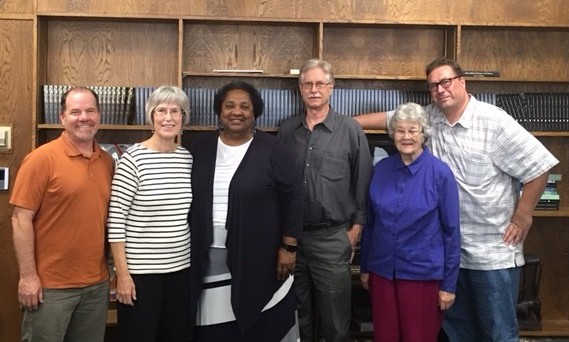We know climate change is a serious threat, as do 81% of Californians, according to a poll by the Public Policy Institute of California. Thanks to the dedication and commitment of SD350 volunteers, we took climate action to Sacramento this summer.
As members of the SanDiego350 Public Policy Team, we work to educate our members and the public, lobby officials and create a healthier climate future. In addition to advocating for improved climate laws at the local level, we also review state legislative bills related to climate change and advocate for their passage or defeat. This year we focused on eight priority bills. We educated ourselves and members of SanDiego350, posting our positions on social media, making making calls to legislators, and lobbying key San Diego Assemblymembers to urge them to vote for our priority bills. We are happy to report that 50% of the priority bills we supported were passed by the legislature and have been signed into law by the governor, including SB 32, a two-year bill we also supported in 2015, which cements California’s place at the forefront of climate action by codifying the state’s ambitious emission reduction targets into law.
The SanDiego350 Public Policy Team decided early in the year to focus on identifying and prioritizing state bills that would reduce air pollution and greenhouse gas emissions and to train SanDiego350 members on advocating for legislation with elected officials. Members of our team identified relevant bills, prioritized the eight we felt were most important, and tracked the progress of these bills over the course of the legislative session.

We sent letters on behalf of SanDiego350 in support of legislation to shut down Aliso Canyon, to include an Environmental Justice element in General Plans, and to prevent coal from being shipped overland to the Oakland Terminal. We worked in concert with our allies in the Bay Area and in San Diego to increase visibility of these bills and encourage their passage in the legislature (for example, we authorized 350 Bay Area to speak for us at committee hearings in the legislature in Sacramento).
We organized a legislative training, which was held in July, and twenty-four people attended. We talked about the best way to lobby elected officials and educated members on our eight priority legislative bills. Subsequently, many of the people who attended the training, as well as other 350 members, took part in meetings with Assembly members Shirley Weber, Lorena Gonzalez and Toni Atkins. The presentation we developed for this training was shared with other 350 groups in California.

At the top of our list of priority bills was SB 32, the California Global Warming Solutions Act of 2006. Authored by Senator Pavley, the bill expands AB 32, California’s seminal climate legislation, extending the state’s targets to reduce greenhouse gas emissions to 40% below 1990 levels by 2030 and codifying into law a key target in Governor Brown’s executive order B-30-15. SB 32 was a 2-year bill (introduced in 2015, but did not pass), conjoined with AB 197, which contained transparency and equity provisions that were previously included in SB 32. Both SB 32 and AB 197 passed and have been signed into law.
Another set of priority bills related to the methane leak at Aliso Canyon — SB 887 and SB 888 and SB 1441. These bills were an essential step in beginning to address the previously unregulated natural gas industry and to prevent another catastrophic methane leak. SB 887 requires numerous safety measures including tests for loss of integrity, an automatic shutoff system, and immediate repairs. Because the Aliso Canyon leak revealed a lack of a meaningful state response plan, SB 888 establishes the Office of Emergency Services as the lead agency for emergency response in the future. It also creates the Gas Storage Facility Leak Mitigation Account, with funds from penalties used to ensure greenhouse gas reductions are made in equal measure to gases emitted by the leak. Both of these bills were passed by the legislature and have been signed into law. SB 1441, which would have prohibited gas corporations from seeking or receiving recovery from ratepayers the value of natural gas lost to the atmosphere during the extraction, production, and delivery of natural gas, failed on the assembly floor.

Another bill on our list was SB 1383: Short Lived Climate Pollutants. This bill requires the California Air Resource Board to complete a comprehensive study to reduce emissions of short-lived climate pollutants. These are pollutants that exist in the atmosphere for a shorter period of time as compared to longer-lived climate pollutants such as carbon dioxide. Some short-lived climate pollutants trap heat in the atmosphere at a level many times more potent than carbon dioxide. The bill sets reduction targets for methane, hydrofluorocarbon gases and black carbon. Although this bill was weakened in the final adoption, it still represents a step forward. The bill was passed by the legislature and has been signed into law by the governor.
The remaining bills on our priority list which did not pass are SB 886 — Electricity: Energy Storage Systems; SB 1453 — Electrical Generation: Greenhouse Gas Emissions Performance Standards; and AB 2222 — Greenhouse Gas Reduction Fund: Transit Pass Program. SB 886 was held in committee and under submission in the assembly. SB 1453 was ordered to the inactive file on the request of Assemblymember Calderon. AB 2222 was held under submission in the senate.
This was an important year for climate justice thanks to the dedication and commitment of SD350 volunteers. We educated ourselves and developed better relationships with local elected officials while advocating for legislative change.The passage of these bills moved us towards reaching our goals for an environmentally-minded and clean energy future. It would not have been possible without the help of our awesome volunteers and partner organizations. We want to thank all the volunteers who worked hard this year with us to help get these bills passed, including: Jana Zawadzki, Ryan O’Connor, Daria Flores, Sumeeta Ghai, James Long, Angela Deegan, Richard Finkmoore, Rev. Garcia-Velasquez, Jessica Sustaita, David Harris, David Gangsei, Ken Brucker, Jean Costa, Elaine Maltz, Masada Disenhouse and Lisa Wellens.
By Carolina Rodriguez and Joyce Lane
SanDiego350 Public Policy Team members
